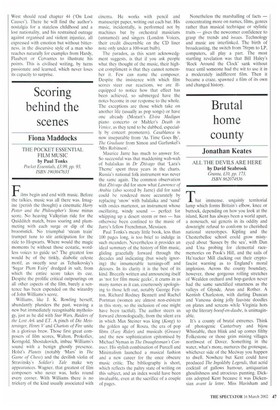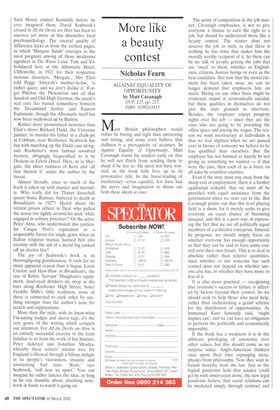Brutal home county
Jonathan Keates
ALL THE DEVILS ARE HERE by David Seabrook Granta, £10, pp. 173, ISBN 862074836 That immense, ungainly territorial lump which forms Britain's elbow, knee or buttock, depending on how you look at the island, Kent has always been a world apart, a nonesuch, sui generis in its oddity and downright refusal to conform to cherished national stereotypes. Kipling and the Chesterbelloc school could grow mistyeyed about 'Sussex by the sea', with Dan and Una probing for elemental racememories on Pook's Hill, and the sails of Ha'nacker Mill clacking out their cryptofascist warning as to England's moral implosion. Across the county boundary, however, those gorgeous rolling stretches of Weaiden orchard and hop-garden never had the same sanctified smartness as the valleys of Glynde. Arun and Rother. A Kentish Charleston, with darling Duncan and Vanessa doing jolly fauviste doodles on plates and screens while Virginia hots up the literary boeuf-en-daube, is unimaginable.
It's a county of brutal extremes. Think of photogenic Canterbury and bijou Whistable, then blink and up comes filthy Folkestone or those grim mining villages northwest of Dover. Something in the water, what's more, nurtures the grotesque, whichever side of the Medway you happen to dwell. Nowhere but Kent could have produced The Ingoldsby Legends, that acrid cocktail of gallows humour, antiquarian ghoulishness and atrocious punning. Dickens adopted Kent because it was Dickensian avant la !awe. Miss Havisham and Satis House existed Kentishly before he ever imagined them. David Seabrook's errand in All the Devils are Here has been to uncover yet more of this distinctive local psychopathology. The visceral quality of difference kicks in from the earliest pages, in which 'Margate Sands' emerges as the most pregnant among all those modernist signifiers in The Waste Land. Tom and Viv holidayed here at the Albemarle Hotel, Cliftonville, in 1921 for their respective nervous disorders. 'Margate', Mrs Eliot told Peggy Ashcroft's mother-in-law, 'is rather queer, and we don't dislike it.' Forget Phlebas the Phoenician and all that Sanskrit and Old High German, the poem's real core lies buried somewhere between the Dreamland funfair and Eastern Esplanade, though the Albemarle itself has now been swallowed up by Butlins.
Rather more pronounced neuroses than Eliot's drove Richard Dadd, the Victorian painter, to murder his father in a chalk-pit at Cobham, near Rochester. Seabrook has fun with matching up the Dadd case alongside Rochester's most famous unsolved mystery, obligingly bequeathed to it by Dickens in Edwin Drood. Here, as in Margate, the sheer rumness of Kent and 'all that therein is' seizes the author by the throat.
Almost literally, since so much of the book is taken up with murder and mortality. Who really did for Thanet dancehall queen Sonia Ramsay, battered to death in Broadstairs in 1927? Heard about the retired prison officer in Deal who pulled the noose too tightly around his neck 'while engaged in solitary practices'? Or the actor, Peter Arne, who undermined this particular Cinque Port's reputation as a respectable haven for single gents when an Italian religious maniac hurried him into eternity with the aid of a metal log yanked off an electric fire?
The joy of Seabrook's book is its thoroughgoing pointlessness. It ends for no more apparent reason than it began. Lords Curzon and Haw-Haw in Broadstairs, the size of Robin 'Servant' Maugham's equipment, dead-eyed drinkers six deep at the bars along Rochester High Street, boxer Freddie Mills's little weakness, none of these is connected to each other by anything stronger than the author's nose for secrets and suppressions.
More than the style, with its know-what I'm-saying nudges and sleeve-tugs, it's the very genre of the writing which compels our attention. For All the Devils are Here is an entirely successful exercise in the form familiar to us from the work of Ian Sinclair, Peter Ackroyd and Jonathan Meades, whereby these writers' intense love for England is filtered through a bilious delight in its people's viciousness, insanity and unrelenting bad taste. 'Kent,' says Seabrook, 'will tear us apart.' You can imagine he rather fancies the idea, as long as he can shamble about, sleuthing notebook in hand, to watch it going on.

















































































 Previous page
Previous page